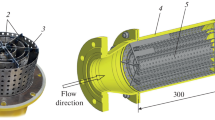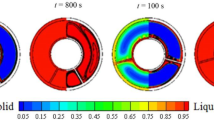Abstract
Purpose: A Lumped Capacitance innovative approach is used here to analyze the transient temperature decay of a pipeline in water, air, and sand.
Design/Methodology/Approach: A straightforward small-scale test equipment was used to measure transient heat loss through steel pipes that were in contact with air, water and sand mediums separately. The pipe was supported in the lab using a lumped capacitance method as part of the air medium experiment. A concentric PVC pipe was used to encase the pipe in the water and sand mediums, with dry sand and water being poured into the annulus. Hot hair was generated in the pipes and transient cool-down tests were carried. Hot water replaced the hot air and another transient cool-down tests were performed.
Findings: Results obtained show experimental approach agreement. Systematic and environmental errors were attributed to a maximum deviation of 21% between design and performance.
Research Limitation/Implications: The transient temperature decay method implored in this work makes no use of the finite element method. This justified by the fact that pipes with complex pipe geometries were not used in the work.
Practical Implication: The experimental methodology presented in this work will allow the prediction of transient cool-down behavior and cool-down duration of the fluids in pipelines using an established theory during the pipelines’ design. This will assist with flow assurance litigation in the oil and gas sector.
Social Implication: This work presents yet another experimental framework needed to advance the workflows within the oil and gas industry for sustainable industrialization.
Originality/Value: The novelty lies in the sustainable and innovative experimental framework for analysing transient temperature decay of oil and gas pipeline in three different media.
Access this chapter
Tax calculation will be finalised at checkout
Purchases are for personal use only
Similar content being viewed by others
References
Awad, M.M.: Fouling of heat transfer surfaces. In: Belmiloudi, A. (ed.) Heat Transfer - Theoretical Analysis, Experimental Investigations and Industrial Systems, pp. 504–542. IntechOpen, London (2011). https://doi.org/10.5772/13696
Aja, A., Ramasamy, M.: Thermal management of flow assurance challenges in offshore fields – a review. J. Eng. Appl. Sci. 11, 6415–6422 (2016)
Beirão, S.G., Ribeiro, A.P., Lourenço, M.J., Santos, F.J., Nieto de Castro, C.A.: Thermal conductivity of humid air. Int. J. Thermophys. 33, 1686–1703 (2012). https://doi.org/10.1007/s10765-012-1254-5
Bernagozzi, M., Charmer, S., Georgoulas, A., Malavasi, I., Michè, N., Marengo, M.: Lumped parameter network simulation of a loop heat pipe for energy management systems in full electric vehicles. Appl. Therm. Eng. 141, 617–629 (2018). https://doi.org/10.1016/j.applthermaleng.2018.06.013
Cullimore, B., Baumann, J.: Steady state and transient loop heat pipe modeling. In: Proceedings of the International Conference on Environmental Systems, Toulouse (2000). https://doi.org/10.4271/2000-01-2316
Dayan, A., Merbaum, A., Segal, I.: Temporary distribution around buried pipe network. Int. J. Heat Mass Transf. 27(3), 409–417 (1984). https://doi.org/10.1016/0017-9310(84)90288-6
Enbin, L., Liuting, Y., Yong, J., **, T., Jian, L., Yuhang, Y.: Simulation on the temperature drop rule of hot oil pipeline. Open Fuels Energy Sci. J. 6, 55–60 (2013). https://doi.org/10.2174/1876973X01306010055
Ferrandi, C., Marengo, M., Zinna, S.: Influence of tube size on thermal behaviour of sintered heat pipe. In: Proceedings of the 2nd European Conference on Microfluidics, Toulouse, pp. 1–12 (2010)
Ferrandi, C., Iorizzo, F., Mameli, M., Zinna, S., Marengo, M.: Lumped parameter model of sintered heat pipe: transient numerical analysis and validation. Appl. Therm. Eng. 50, 1280–1290 (2013). https://doi.org/10.1016/j.applthermaleng.2012.07.022
Haigh, S.K.: Thermal conductivity of sand. Géotechnique 62(7), 617–625 (2012). https://doi.org/10.1680/geot.11.P.043
King, T., Phillips, R., Johansen, C.: Pipeline routing and burial depth analysis using GIS software. In: Proceedings of the Artic Technology Conference, SPE, Houston, pp. 1–11 (2011). https://doi.org/10.4043/22085-MS
Kodešová, R., et al.: Thermal properties of representative soils of the Czech Republic. Soil Water Res. 8(4), 141–150 (2013). https://doi.org/10.17221/33/2013-SWR
Král, R.: An experimental investigation of unsteady thermal processes on a pre-cooled circular cylinder of porous material in the wind. Int. J. Heat Mass Transf. 77, 906–914 (2014). https://doi.org/10.1016/j.ijheatmasstransfer.2014.06.045
Lienhard, J.H., Lienhard, J.H.: A Heat Transfer Textbook, 5th edn. Phlogiston Press, Cambridge (2020)
Mcneil, D.A., Raeisi, A.H., Kew, P.A., Hamed, R.S.: Flow boiling heat transfer in micro to macro transition flows. Int. J. Heat Mass Transf. 65, 289–307 (2013). https://doi.org/10.1016/j.ijheatmasstransfer.2013.05.077
Mishra, M., Kumar, P.: Experimental lumped analysis of different solid geometries. IOP Conf. Ser. Mater. Sci. Eng. 691, 1–9 (2019). https://doi.org/10.1088/1757-899X/691/1/012082
Nyukuri, N.W., Sigey, J.K., Okelo, J.A., Okwoyo, J.M.: Numerical study of heat transfer on fully buried pipeline under steady–periodic thermal boundary conditions. SIJ Trans. Comput. Sci. Eng. Appl. 2(7), 229–235 (2014)
Oh, D.-W., Park, J.M., Lee, K.H., Zakarian, E., Lee, J.: Effect of buried depth on steady-state heat-transfer characteristics for pipeline-flow assurance. SPE J. 19(6), 1162–1168 (2014). https://doi.org/10.2118/166595-PA
Otomi, O.K., Onochie, U.P., Obanor, A.I.: Steady state analysis of heat transfer in a fully buried crude oil pipeline. Int. J. Heat Mass Transf. 146, 1–7 (2020). https://doi.org/10.1016/j.ijheatmasstransfer.2019.118893
Ovuworie, C.: Steady-state heat transfer models for fully and partially buried pipelines. In: Proceedings of the CPS/SPE International Oil and Gas Conference and Exhibition, Bei**g, pp. 1–7. SPE (2010). https://doi.org/10.2523/131137-MS
Ramires, M.L., Nieto de Castro, C.A.: Standard reference data for the thermal conductivity of water. J. Phys. Chem. Ref. Data 24, 1377 (1995). https://doi.org/10.1063/1.555963
Sadegh, A., Jiji, L., Weinbaum, S.: Boundary integral equation technique with application to freezing around a buried pipe. Int. J. Heat Mass Transf. 30(2), 223–232 (1987). https://doi.org/10.1016/0017-9310(87)90110-4
Smits, K.M., Sakaki, T., Limsuwat, A., Illangasekare, T.H.: Thermal conductivity of sands under varying moisture and porosity in drainage–wetting cycles. Vadose Zone J. 9(1), 172–180 (2010). https://doi.org/10.2136/vzj2009.0095
Suman, B., De, S., DasGupta, S.: Transient modeling of micro-grooved heat pipe. Int. J. Heat Mass Transf. 48, 1633–1646 (2005). https://doi.org/10.1016/j.ijheatmasstransfer.2004.11.004
Sunday, N., Settar, A., Chetehouna, K., Gascoin, N.: An overview of flow assurance heat management systems in subsea flowlines. Energies 14(2), 458 (2021). https://doi.org/10.3390/en14020458
Wang, H., An, C., Duan, M., Su, J.: Transient thermal analysis of multilayer pipeline with phase change material. Appl. Therm. Eng. 165, 114512 (2020). https://doi.org/10.1016/j.applthermaleng.2019.114512
Wojtkowiak, J.: Lumped thermal capacity model. In: Hetnarski, R.B. (eds.) Encyclopedia of Thermal Stresses, pp. 2808–2817. Springer, Dordrecht (2014). https://doi.org/10.1007/978-94-007-2739-7_393
Zakarian, E., Holbeach, J., Morgan, J. E.: A holistic approach to steady-state heat transfer from partially and fully buried pipelines. In: Proceeding of the Offshore Technology Conference, Houston, pp. 1–5. SPE (2012). https://doi.org/10.4043/23033-MS
Author information
Authors and Affiliations
Corresponding author
Editor information
Editors and Affiliations
Ethics declarations
The authors declare that they have no conflict of interest.
Rights and permissions
Copyright information
© 2023 The Author(s), under exclusive license to Springer Nature Switzerland AG
About this paper
Cite this paper
Akoto, R.N.A., Owusu, J.J., Mussey, B.K., Obeng-Agyemang, G., Atepor, L. (2023). Lumped – Capacitance Design for Transient Heat Loss Prediction in Oil and Gas Production Pipes in Various Media. In: Aigbavboa, C., et al. Sustainable Education and Development – Sustainable Industrialization and Innovation. ARCA 2022. Springer, Cham. https://doi.org/10.1007/978-3-031-25998-2_14
Download citation
DOI: https://doi.org/10.1007/978-3-031-25998-2_14
Published:
Publisher Name: Springer, Cham
Print ISBN: 978-3-031-25997-5
Online ISBN: 978-3-031-25998-2
eBook Packages: Business and ManagementBusiness and Management (R0)




